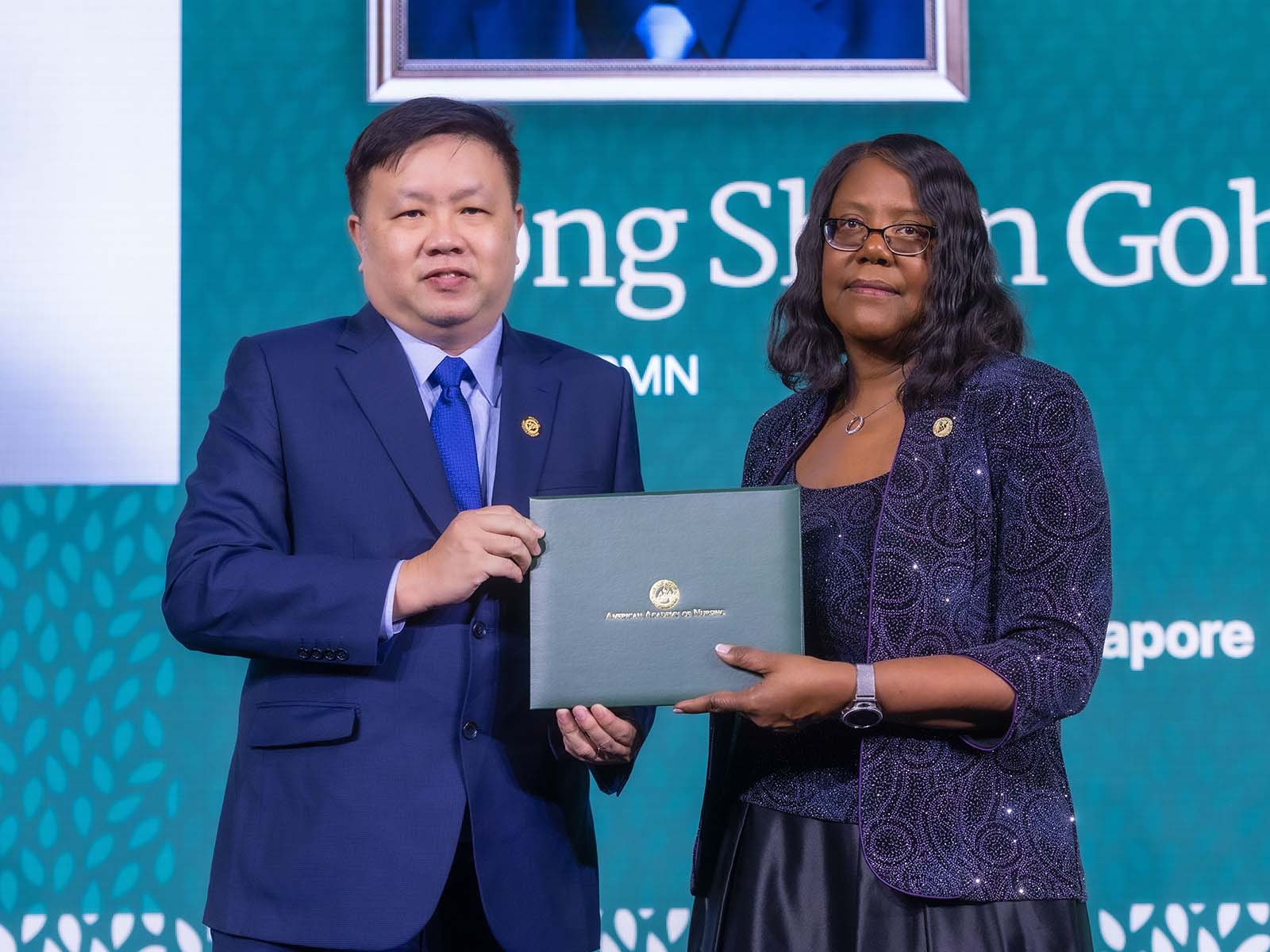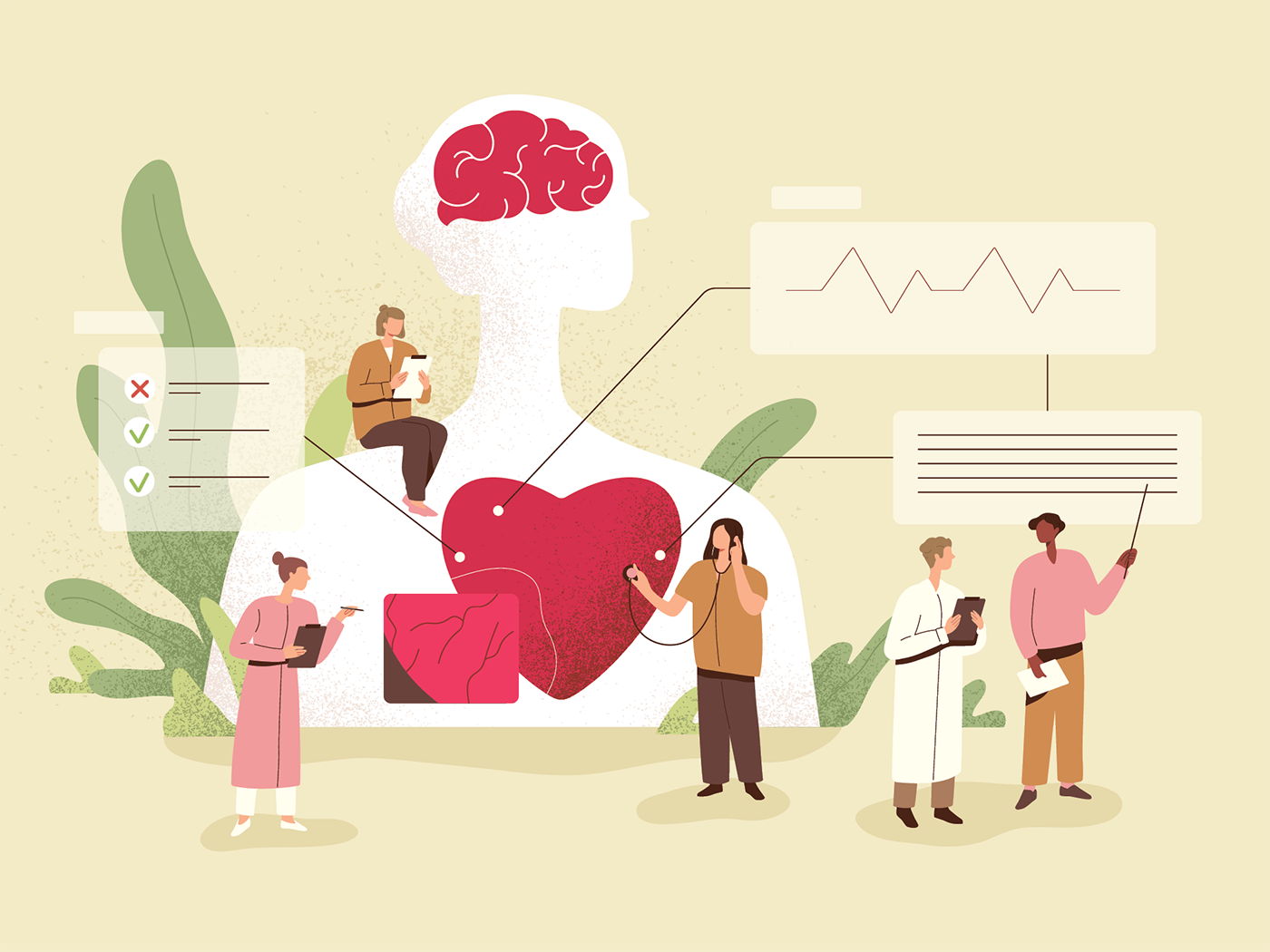
Issue 49
Feb 2024
NURSING

Assistant Professor Shawn Goh is the fourth academic from Alice Lee Centre for Nursing Studies (NUS Nursing), National University of Singapore Yong Loo Lin School of Medicine to be inducted into the American Academy of Nursing (AAN) as a Fellow. The other AAN Fellows are Professor Wang Wenru, Professor He Hong-Gu and Assistant Professor Catherine Dong.
A/Prof Shawn Goh was among one of 253 nurse leaders inducted at the New Fellow Induction Ceremony that took place on 8 October 2023 in Washington DC, US. Retracing his journey from the beginning, he chats with MediCine about his passions, his most memorable project, current research focus, and aspirations for the future.
MediCine: Congratulations on your achievement! How did you feel when you first knew that you would be in AAN’s 2023 Class of Fellows?
A/Prof Goh: I didn’t expect that I would be inducted—so it was a very pleasant surprise. With around 400 fellowship applicants from around the world and only 253 inducted, it is an honour to be the only Fellow from Singapore inducted into this prestigious Fellowship in 2023. Additionally, this year happens to be the 50th anniversary of the AAN. This makes my induction extra special.
MediCine: You attended the induction ceremony. How was it?
A/Prof Goh: Just imagine, the people I met at the ceremony are people who write models we use in our teaching, people we cite in our research papers, and people whose work influence how we practice as nurses. Then there are also the nurses who sit in the US Senate, influencing policy across the whole US. It’s very inspiring to come face-to-face with all these people and see how the Academy actualises its mission of impacting people’s lives. But if I were to choose one favourite moment, it has to be when I got to take pictures with my idol, Emerson Ea, whose works I cited in my own PhD thesis.
MediCine: Can you share with us the journey leading up to your AAN fellowship?
A/Prof Goh: I started off in the practice as a mental health nurse. Although I subsequently moved on to teaching, I never forgot my beginning. Thus, when I pursued my Master in Nursing in 2009, I decided to take the opportunity to do something that can help to advance mental health knowledge and healthcare. During this time, I realised that a lot of our knowledge about mental healthcare came from research and studies conducted overseas. While the literature is useful in providing guidance, differences in cultural and context limit their usefulness and applicability to our situation. That was how I got started on research—and kept going.
This is the fourth consecutive year that someone from NUS Nursing is inducted as an AAN Fellow. As a fairly young school in a small city state, this is an achievement and a recognition of the work that we do in Asia.”
Over the years, mental health has seen growing interest. People have become more open to talking about it and are more aware of mental health needs. Correspondingly, there is also a shift in research focus. The emphasis is increasingly changing from studying about reactive care of the disease state to preventive strategy—like how to protect the mental well-being of people like you and me. Insights into these pertinent issues help to inform policymakers, and hopefully come in useful in the future.
One such example is my research on “The Impact of COVID-19 on Nurses Working in a university health system in Singapore: A Qualitative Descriptive Study”. Published at a time when little was known about COVID-19 and vaccines were still under development, the study proved to be timely and useful for subsequent research done during the pandemic. It was the top cited article in the International Journal of Mental Health from 2020 to 2021, and again from 2021 to 2022. While this study is unlikely to remain as the top cited paper forever, my hope is that the knowledge can help future nurses and future healthcare workers if another pandemic should happen.
As much as my curiosity and thirst for learning guides my research, they also influence the way I teach my classes. The relationship I have with my students is bi-dimensional. I am simultaneously a teacher and a student—I impart what I know from my practice, reading and research to my students, but I also learn about social media and other trends from them. This makes teaching very fulfilling and stimulating—some of these interactions gave life to my research topics.
MediCine: What is next on the horizon for you?
A/Prof Goh: I see the fellowship as an affirmation of what I’ve been doing. Hence, I am going to keep doing what I am passionate about—teaching and research. There is a certain synergy between the two. For instance, some of my research involves teaching or the evaluation of my teaching outcomes. Other times, I gained a deeper understanding of issues patients face through my research on the ground. I share these in classes to better prepare students who are eventually going to be nurses in the field one day.
The blending of teaching and research has brought me much joy over the years—they provide learning opportunities and quench my thirst for knowledge. Of course, not every day is sunshine and rainbows, and there are times when I feel less enthusiastic. But I embrace every aspect of teaching and research, including the challenging ones.
About the American Academy of Nursing Fellowship
With over 3,000 Fellows, the American Academy of Nursing fellowship comprises Nursing’s most accomplished leaders in education, management, practice, and research. More than a recognition of one’s achievements within the Nursing profession, each Academy Fellow has the responsibility to contribute their time and energy to six areas.
|
• |
Enhance quality of health and nursing |
|
• |
Promote healthy ageing and human development across the life continuum |
|
• |
Reduce health disparities and inequalities |
|
• |
Shape healthy behaviours and environments |
|
• |
Integrate mental and physical health |
|
• |
Strengthen the nursing and health delivery system, nationally and internationally |
More from this issue



